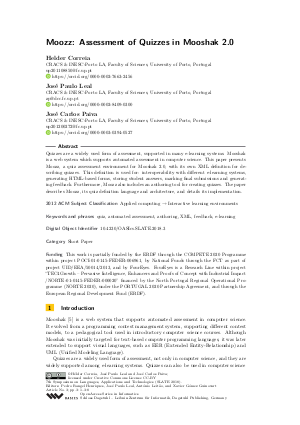Moozz: Assessment of Quizzes in Mooshak 2.0 (Short Paper)
Authors
Helder Correia  ,
José Paulo Leal
,
José Paulo Leal  ,
José Carlos Paiva
,
José Carlos Paiva 
-
Part of:
Volume:
7th Symposium on Languages, Applications and Technologies (SLATE 2018)
Part of: Series: Open Access Series in Informatics (OASIcs)
Part of: Conference: Symposium on Languages, Applications and Technologies (SLATE) - License:
 Creative Commons Attribution 3.0 Unported license
Creative Commons Attribution 3.0 Unported license
- Publication Date: 2018-07-13
File

PDF
OASIcs.SLATE.2018.3.pdf
- Filesize: 445 kB
- 8 pages
Document Identifiers
Subject Classification
ACM Subject Classification
- Applied computing → Interactive learning environments
Keywords
- quiz
- automated assessment
- authoring
- XML
- feedback
- e-learning
Metrics
- Access Statistics
-
Total Accesses (updated on a weekly basis)
0Document
0Metadata
Abstract
Quizzes are a widely used form of assessment, supported in many e-learning systems. Mooshak is a web system which supports automated assessment in computer science. This paper presents Moozz, a quiz assessment environment for Mooshak 2.0, with its own XML definition for describing quizzes. This definition is used for: interoperability with different e-learning systems, generating HTML-based forms, storing student answers, marking final submissions and generating feedback. Furthermore, Moozz also includes an authoring tool for creating quizzes. The paper describes Moozz, its quiz definition language and architecture, and details its implementation.
Cite As Get BibTex
Helder Correia, José Paulo Leal, and José Carlos Paiva. Moozz: Assessment of Quizzes in Mooshak 2.0 (Short Paper). In 7th Symposium on Languages, Applications and Technologies (SLATE 2018). Open Access Series in Informatics (OASIcs), Volume 62, pp. 3:1-3:8, Schloss Dagstuhl – Leibniz-Zentrum für Informatik (2018)
https://doi.org/10.4230/OASIcs.SLATE.2018.3
BibTex
@InProceedings{correia_et_al:OASIcs.SLATE.2018.3,
author = {Correia, Helder and Leal, Jos\'{e} Paulo and Paiva, Jos\'{e} Carlos},
title = {{Moozz: Assessment of Quizzes in Mooshak 2.0}},
booktitle = {7th Symposium on Languages, Applications and Technologies (SLATE 2018)},
pages = {3:1--3:8},
series = {Open Access Series in Informatics (OASIcs)},
ISBN = {978-3-95977-072-9},
ISSN = {2190-6807},
year = {2018},
volume = {62},
editor = {Henriques, Pedro Rangel and Leal, Jos\'{e} Paulo and Leit\~{a}o, Ant\'{o}nio Menezes and Guinovart, Xavier G\'{o}mez},
publisher = {Schloss Dagstuhl -- Leibniz-Zentrum f{\"u}r Informatik},
address = {Dagstuhl, Germany},
URL = {https://drops.dagstuhl.de/entities/document/10.4230/OASIcs.SLATE.2018.3},
URN = {urn:nbn:de:0030-drops-92615},
doi = {10.4230/OASIcs.SLATE.2018.3},
annote = {Keywords: quiz, automated assessment, authoring, XML, feedback, e-learning}
}
Author Details
Funding
This work is partially funded by the ERDF through the COMPETE 2020 Programme within project POCI-01-0145-FEDER-006961, by National Funds through the FCT as part of project UID/EEA/50014/2013, and by FourEyes. FourEyes is a Research Line within project "TEC4Growth - Pervasive Intelligence, Enhancers and Proofs of Concept with Industrial Impact /NORTE-01-0145-FEDER-000020" financed by the North Portugal Regional Operational Programme (NORTE 2020), under the PORTUGAL 2020 Partnership Agreement, and through the European Regional Development Fund (ERDF).
References
-
Valentina Dagienė and Sue Sentance. It’s computational thinking! Bebras tasks in the curriculum. In International Conference on Informatics in Schools: Situation, Evolution, and Perspectives, pages 28-39, 2016.

-
Valentina Dagiene and Gabriele Stupuriene. Bebras-a sustainable community building model for the concept based learning of informatics and computational thinking. Informatics in Education, 15(1):25, 2016.

- Ginés Gárcia-Mateos and José Luis Fernández-Alemán. A course on algorithms and data structures using on-line judging. ACM SIGCSE Bulletin, 41(3):45-49, 2009. URL: http://dx.doi.org/10.1145/1562877.1562897.
-
Gaurav Kumar and Anu Suneja. Using Moodle - an open source virtual learning environment in the academia. International Journal of Enterprise Computing and Business Systems, 1(1):1-10, 2011.

-
José Paulo Leal and Fernando Silva. Mooshak: A web-based multi-site programming contest system. Software: Practice and Experience, 33(6):567-581, 2003.

-
José Carlos Paiva, José Paulo Leal, and Ricardo Alexandre Queirós. Enki: A pedagogical services aggregator for learning programming languages. In Conference on Innovation and Technology in Computer Science Education, pages 332-337, 2016.

-
Niall Sclater and Rowin Cross. What is IMS question and test interoperability. Retrieved, 7(22), 2003.

-
Colin Smythe, Eric Shepherd, Lane Brewer, and Steve Lay. IMS question &test interoperability: an overview, 2002. Final Specification, version 1.2.

